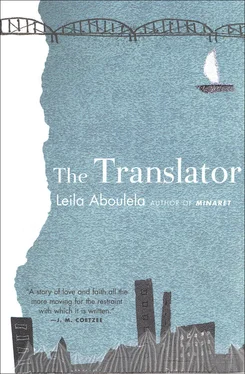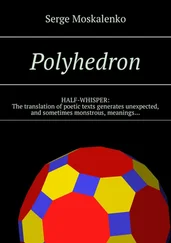The dreams were good for her, stinging like antiseptic. She gathered the courage to telephone a driving school, book a first lesson. The instructor, a large, lively woman with white hair, took her to an empty stretch of road near Hazelhead park. It came back to her, the driving she had been taught by ‘Am Ahmed, changing gears, the nice sound the hand-brake made when it was pulled. But when they went out onto a busier road, she panicked every time a car passed her in the opposite direction. She would cringe at the sight of the approaching car, turn the steering wheel to the left and instinctively go over the shahadah: I bear witness there is no god but Ailah … while the instructor reached to steady the steering wheel with her hand. When Rae telephoned that evening of her first lesson, she was in tears, ‘I’ve forgotten everything, I’ll never learn, I’ll never pass any driving test.’ He laughed at her and said, ‘Of course you’ll learn, it will all come back. Don’t say you’re stupid, you’re not stupid.’ He said encouraging things while her tears made the receiver slippery in her hand.
Sammar walked to work through familiar streets. She knew where the road changed from asphalt to cobbles. Even certain people’s faces had become familiar over time. Years ago, these same streets were a maze of culture shocks. Things that jarred — an earring on a man’s earlobe, a woman walking a dog big enough to swallow the infant she was at the same time pushing in a pram, the huge billboards on the roads: Wonderbra, cigarette ads that told people to smoke and not smoke at the same time, the Ministry of Sin nightclub housed in a former church. Now Sammar did not notice these things, did not gaze at them, alarmed, as she had done years before. Her eyes had grown numb over the years and she had found out, gradually, and felt reassured, that she was not alone, that not everyone believed what the billboards said, not everyone understood why that woman kept such a large ferocious dog in her home.
The campus was quiet as she had expected it to be, not so many cars parked in the car park, the department building empty of students. Sammar’s room was on the top floor, where a window looked straight up at the sky. She liked her room because of the sunlight that came from that window. She shared the room with Diane, one of Rae’s Ph.D. students. To Sammar’s surprise, the room was open, the lights were on and Diane was hunched over some photocopied sheets, surrounded by her usual accessories of pens, Diet Coke, Yorkie bars, a ham and pickle sandwich.
‘I thought you would be away; it’s nice to see you.’ Sammar hung her coat up on the hook behind the door. ‘What happened? Didn’t you go home?’ Home for Diane was Leeds.
‘I did but I came back last night.’ She held her face in her hand, looking up at Sammar.
‘You look tired.’
‘Too many late nights, too many parties.’ Diane smiled, took off her glasses, sniffed and put her head down on the desk. She had straight blonde hair and it fell now and slipped over the pages on the desk. Without her glasses she looked younger and less studious. Sammar was conscious of how young Diane was, nearly eight years her junior and so independent in comparison to how Sammar had been at that age. Independent and another source of culture shock that had mellowed over time. “… I bought my mum knickers for Christmas’, ‘… met him at the pub’,’… hardly anyone showed up for Rae’s lecture this morning, there was a big piss-up last night’, ‘… I definitely don’t want to have children. I am never going to get married’. Diane repeated that last sentence often, something that she felt strongly about. Had Sammar been back home and Diane one of her old friends, she would have replied, ‘Are you mad? You want to live celibate all your life!’ and they both would have started laughing. Here, she just said quietly to Diane, ‘Maybe you’ll change your mind and get married one day.’
‘Did you go anywhere?’ Diane now asked.
‘No,’ but Sammar felt that she had been away, far away to a place where she was content. She switched on the computer that was on her desk, pushed the button on the monitor and the screen flickered. The computer began its memory check. ‘I am going away early next month. I’m going to Cairo then I’ll go to Khartoum and bring my son back with me.’ Diane put on her glasses and looked at her with sleepy eyes. She yawned.
‘So is it a problem getting your son in, immigration and all that.’
‘No, he was born here. So was I.’
‘Really? I didn’t know.’
‘Didn’t I ever mention it? My father was studying here at the time. That’s how I got a British passport. They’ve changed the law now. But back then, everyone who was born in Britain was eligible for a passport. So it’s no problem about bringing my son.’
Diane looked disappointed as if she had been expecting a hardluck story about the injustice of the Home Office.
If it had not been for the passport, Sammar would not have been here now. It was because coming back to live in Britain was feasible that she had got on the plane after quarrelling with her aunt, sold her gold bracelets for the one-way ticket. She had chosen Aberdeen for the tie with Tarig and because she had worked temporarily for the university and there was a chance that they could give her work again. She had been lucky. There was a demand for translating Arabic into English, not much competition. Her fate was etched out by a law that gave her a British passport, a point in time when the demand for people to translate Arabic into English was bigger than the supply. ‘No,’ she reminded herself, ‘that is not the real truth. My fate is etched out by Allah Almighty, if and who I will marry, what I eat, the work I find, my health, the day I will die are as He alone wants them to be.’ To think otherwise was to slip down, to feel the world narrowing, dreary and tight.
She scrolled through her files, clicked with the mouse the one that she wanted. Diane was talking about the last time she saw Rae before she went to Leeds.
‘… not in the best of moods. I wanted to get some papers from him and he said, “You can find them in the library, I haven’t got them.” But I know he has them. Then all I got from him was a lecture on how the library does not close every single day of the holidays.’
Sammar smiled as Diane groaned and put her head down on the desk.
‘And he gave me this.’ She waved in front of Sammar a student essay with a yellow post-it note attached to it. Sammar read Rae’s handwriting on the little note, ‘Diane, fourteen is far too generous for such a poorly-referenced essay.’ Diane took the tutorials for one of Rae’s undergraduate classes and sometimes she had to mark the students’ work.
‘How much does he want you to give it then?’ said Sammar.
‘Eleven at the most.’ Diane starting taking out her sandwich from its packaging.
‘Well, eleven is a pass, isn’t it?’
‘I want to encourage her. Fourteen would have encouraged her but the bastard is just so finicky.’
‘Maybe she could rewrite it.’
‘She won’t do that, she’ll just take the eleven.’ Diane dropped the essay back on the far corner of her desk and eating her sandwich, bent her head down over her work.
Sammar was glad that Diane was back. She did not like being alone and it always pleased her when Diane mentioned Rae. It was like when Yasmin talked about him only that Diane was spontaneous and not suspicious, while Yasmin had recently begun to frown disapprovingly every time Sammar asked her about Rae, snapping, ‘Are you expecting him to become a Muslim so he could marry you?’ Sammar wondered if Yasmin was back from Manchester, where she had gone with Nazim to visit his parents. Later, on her way home, she would go to Rae, see if he was back, pass the secretaries’ office and see if Yasmin was also back.
Читать дальше












